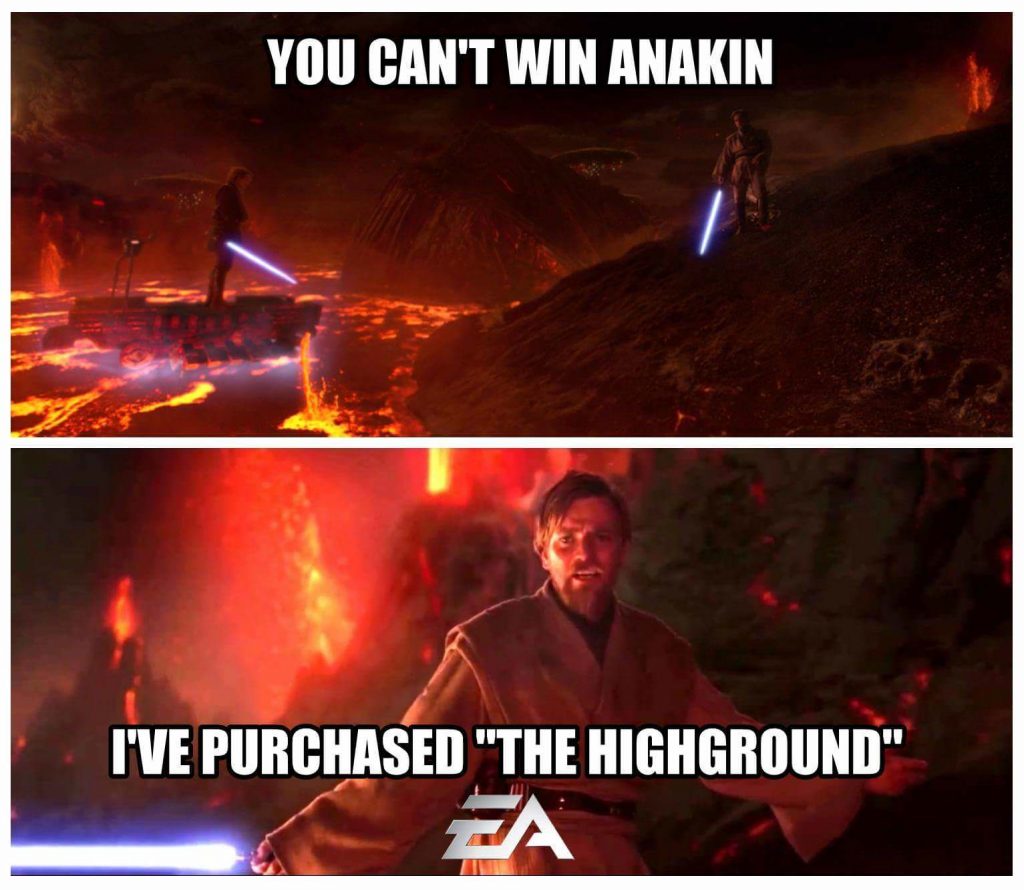The Proper Way Games Should Do Microtransactions | Learnings from the EA Fiasco
Microtransactions don't always have to be bad especially when done RIGHT!

Over the past few days, the internet gaming community has been ablaze with a lot of hatred towards the EA regarding the recently launched Star Wars Battlefront II. The recent controversy has put EA’s business practices and the concept of Microtransactions into the spotlight.

Just one of the many memes brought about by the Star Wars Battlefront II Controversy
However, Microtransactions and paywalls on videogames are not new. Nor has this been the first time anyone has ever voiced out frustration over it. Many gamers actually feel like we’ve moved past the golden era of buying COMPLETE games as we now live in an era where you buy the incomplete games and get the missing pieces via DLC.


But if microtransactions and DLCs are so bad, why are plenty of games doing it? and why haven’t their communities expressed the same outrage as how people have with regard to the EA – Star Wars Battlefront II fiasco? The answer is simple: MICROTRANSACTIONS and DLCs aren’t bad… not inherently, at least. There’s a proper way to do it that the community will respect, support, and maybe even love.
So let’s take this moment to analyze the case of EA and see what learnings we can get from the recent outrage.
The EA – Star Wars Battlefront Controversy
It all started with the now-just-launched Star Wars Battlefront II. The game is an action shooter video game that, at the core, pits you vs other players in huge multiplayer battles. It lets you play as various normal character classes AND as iconic Star Wars heroes.
Some people who have EA Access discovered during the trial period that unlockable heroes like Luke Skywalker and Darth Vader could be unlocked via microtransactions OR by grinding for around 40 hours. This information was shared to people in reddit which really riled up the community. The outcry got bigger and bigger that an EA rep went on Reddit for an AMA (Ask Me Anything) to hopefully quell the issue. It didn’t.
“This age of ‘micro-transactions’ has gone WAY too far. Leave it to EA to stretch the boundaries.”
“Seriously? I paid 80$ to have vader locked?”
As of the moment, this comment is the single most downvoted comment on Reddit, by huge order of magnitude. Surprisingly (or unsurprisingly), the majority of other downvoted comments are also from EA.

Needless to say, people were fuming. Boycotts were being declared and memes were going viral. This led to more than 70,000 pre-orders of the game being cancelled and, even worse, the EA stock price definitely took a hit especially since the loot box system of Battlefront was now being scrutinized as a form of gambling. With the upcoming Disney movie about to come out, you can see why this definitely was a cause of concern for both Disney and EA.

What this should teach Game Companies
So that went REALLY bad but aside from that being a bad experience, it should be a cautionary tale and a learning point. Not just for other gaming companies, mind you, but for EA itself as well. You can’t deny the fact that EA does have the capacity to produce good games so if they learn from this scenario then it may turn things around for them as well.
Anyway, let’s get to the learnings!
1. Microtransactions and DLCs are much more acceptable when it comes from a FREE GAME

When your game is free to play, people know that these microtransactions are one of the few ways you have to earn. Plus the community respects that you let them play the full game for free but give them the option purchase things to speed up certain processes or to access ADDITIONAL content since you like the game so much.
It’s different when your game carries a full price tag of around 50-80 USD. When people buy your game at this price tag, they EXPECT a FULL GAME and become much more vigilant as to what kind of DLCs and Microtransactions you have. Which leads me to the next learning…
2. Never lock ESSENTIAL / CORE aspects of your game behind a paywall

DLCs should always be nice-to-haves. They should ADD TO THE GAME and they should never be things that the game should’ve had in the first place. Going back to the EA example, Luke Skywalker and Darth Vader are practically ESSENTIAL to the Star Wars Experience. You could argue against that previous statement but, especially with how the reaction was, fans clearly see them as a vital part of the Star Wars Battlefront II Experience. It’s almost comparable to having a Legend of Zelda game and having Link and Zelda as unlockable DLC.
This isn’t limited to characters though. Remember, it’s all about giving A FULL EXPERIENCE with your base game and ENHANCING / ENRICHING the experience with DLC / microtransactions.
3. Balance Consumer Satisfaction with Business Objectives

One of the many memes that came out against EA
Gamers today are smart. They know that Gaming is still a business, that it isn’t cheap to make a game, that people need to get paid so they can eat, etc. So they are very much aware that every game aka every project has business objectives. In pursuing this, you should never pursue it at the cost of customer satisfaction.
Let’s take a look at the EA situation again. The EA Rep went to reddit and answered the angry feedback with the statement “The intent is to provide players with a sense of pride and accomplishment for unlocking different heroes.” But people didn’t like this answer because they felt like it was just an excuse for a corporate cash grab. This was further reinforced when EA reduced the price of the characters from 40k down to 15k. Good right? Except they also reduced the amount of in-game rewards you get, rewards you need to unlock said characters. According to Soeren Kamper from swtorstrategies.com (who did the math), it’s estimated that it’ll take 4,528 hours (or $2100) to unlock all content in the base game. The rewards in arcade mode are time-gated as well.
The worst part of the game is this: You are limited on credits earned in Arcade mode. “More credits available in 14 hours” pic.twitter.com/8NOTvby2hl
— Andrew Reiner (@Andrew_Reiner) November 13, 2017
The business objectives here were obvious: INCREASED PLAYTIME (due to the grind) and REVENUE. But because these came across as things that EA valued more than their customers. It felt blatant that they wanted to pursue these objectives more than pleasing their customers hence people really went against it. The learning here is strike a balance with your customers always coming first. I understand that there’s an inflation of game development costs vis-a-vis the expectations of gamers. Triple A games are becoming more and more expensive to develop, and devs and studios need to recoup their investment. But being anti-consumer is never the way.
4. NEVER make your Game PAY-TO-WIN

Games like Overwatch, Dota 2, and CS:GO have been around for some time, and have rarely drawn criticism over its implementation of its microtransactions. Or if they have, the outrage isn’t at the same level as EA. The difference is that while microtransactions exist, there is no impact on gameplay. The microtransactions aspect only appear cosmetic. This is important on two levels.
One, it doesn’t feel forced. Gamers don’t feel the need to shell out additional cash to progress in game, or improve their gameplay. This gives players a sense of control over their cash, and them giving freely to the company only reflects whether they have enjoyed the game or not. Two, it doesn’t affect gameplay. When CS:GO was trying to monetize (despite the already $15 price tag), developers made sure that the skins only apply to weapons (and currently, gloves), and not to the player model. Why? They want to make sure that the moment you see another character, you can immediately identify if it’s a friend or foe. Having microtransactions not affect gameplay means everyone is on an equal footing, skillwise.
Darth Vader IS a strong hero so having him hard-to-grind BUT can be bought via microtransaction makes it so that people can just BUY this game advantage. Don’t go this route.
Even with the recent resolution of EA to deactivate microtransactions for now to recalibrate things on their end, the PR damage has been done. The most that we (whether you’re a company, a developer, a game creator, or just simply a player) can take from this sad event is to learn. To be better. To avoid these mistakes. Like I said, even EA themselves can learn from this to become better. Do microtransactions right and everyone wins 🙂


